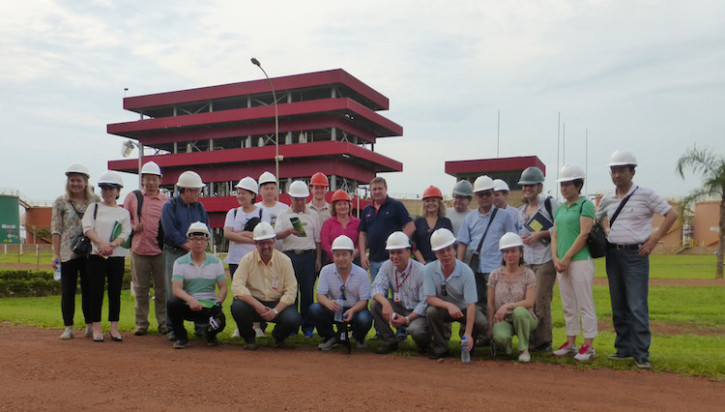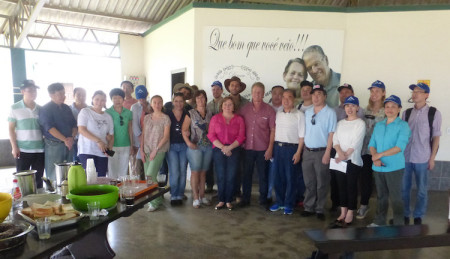By Isabel Nepstad

During the second week of December, the Paulson Institute led a delegation of top Chinese soy industry representatives to Brazil on a learning trip to better understand soy production and its environmental impacts. With the Chinese market accounting for over 73% of Brazil’s soy exports, Chinese players have a significant impact on the country’s soy industry complex.
The trip was organized together with our Sustainable Soy Trade Platform (SSTP) partners Solidaridad, The Nature Conservancy, and WWF, with sponsorship by the Gordon and Betty Moore Foundation. Eight members from top Chinese companies attended, including Chongqing Grains Group, COFCO, CP Group, Jiusan Group, Sanhe Hopefull Group, Shandong Scents Group, Shengquan Oils, and the online data company China Grain and Oils Business Net.
During the trip, the Chinese delegation stressed their collective commitment to sourcing soy that doesn’t contribute to deforestation. “The companies that make up this delegation import more than 20 million tons of soy annually to China, and the tendency is for that to increase,” Liu Denggao, executive vice president of the China Soybean Industry Association and head of the delegation, said in a meeting with Carlos Favaro, the acting governor of Mato Grosso, the largest soy-producing state in Brazil. “We do not want our demand for soy to lead to deforestation in Brazil, and we are asking our suppliers for assurances in that respect.”
Commercial agriculture and deforestation together account for 24% of global greenhouse emissions, and scientists agree that reducing tropical deforestation will be a key factor in slowing climate change. The Brazilian government has been making progress in controlling deforestation from rapid expansion of soy plantation, but implementation of its strict Forest Code (a law which seeks to limit the amount of forest that can be cleared in any given area) at the local level is still a challenge.
 The delegation spent a week in Brazil, starting in Sao Paulo with visits to the Brazilian Rural Society and the Brazilian Association of Vegetable Oil Exporters. In Mato Grosso, the Chinese delegation met the Soy Producer Association of Mato Grosso and was received by Carlos Favaro, the acting governor, and Eduardo Moura, the state secretary of regional development. Themes discussed included market tendencies in Brazil and China, transport bottlenecks, environmental initiatives and sustainability, and progress and challenges in implementing Brazil’s Forest Code.
The delegation spent a week in Brazil, starting in Sao Paulo with visits to the Brazilian Rural Society and the Brazilian Association of Vegetable Oil Exporters. In Mato Grosso, the Chinese delegation met the Soy Producer Association of Mato Grosso and was received by Carlos Favaro, the acting governor, and Eduardo Moura, the state secretary of regional development. Themes discussed included market tendencies in Brazil and China, transport bottlenecks, environmental initiatives and sustainability, and progress and challenges in implementing Brazil’s Forest Code.
By the end of the trip, the learning and exchange opportunities left a deep impression on the Chinese delegation. Having seen the challenges up close, the representatives expressed deep concern over the environmental impacts of the soy industry. While progress has been made, more work lies ahead to ensure a sustainable deforestation-free supply chain. It was agreed that no one company could tackle the shared challenges alone.
Through the establishment of the SSTP, stakeholders can share best practices and market information, discuss solutions and develop consensus around the best way to promote sustainable global agricultural business. Specifically, the project seeks to increase the proportion of soy sourced from registered Brazilian farmers—meaning farmers who follow strict environmental legislation—and exported to China by international conglomerates Cargill and Bunge. Led by the Paulson Institute with support from the Moore Foundation, the initiative is working to maximize the purchase of soy grown by farmers enrolled in the CAR system—a Brazilian regulation that ensures conservation of natural habitats.
Isabel Nepstad is a Program Officer at Solidaridad China focused on market development and stakeholder engagement in the soy program.



